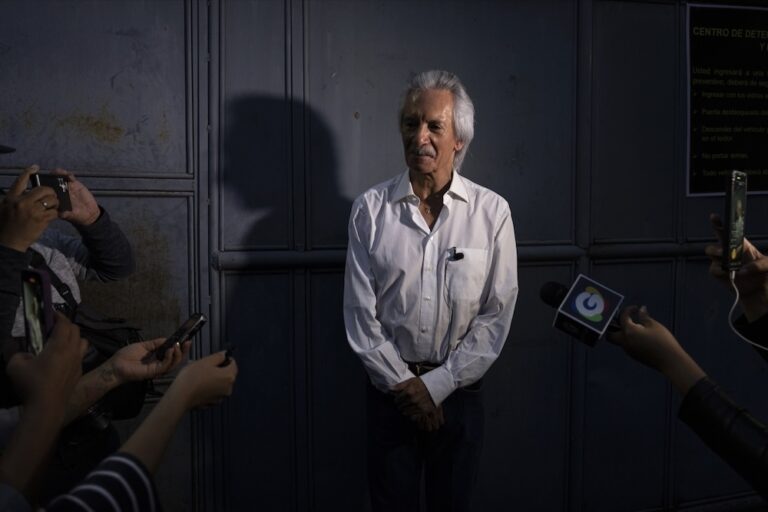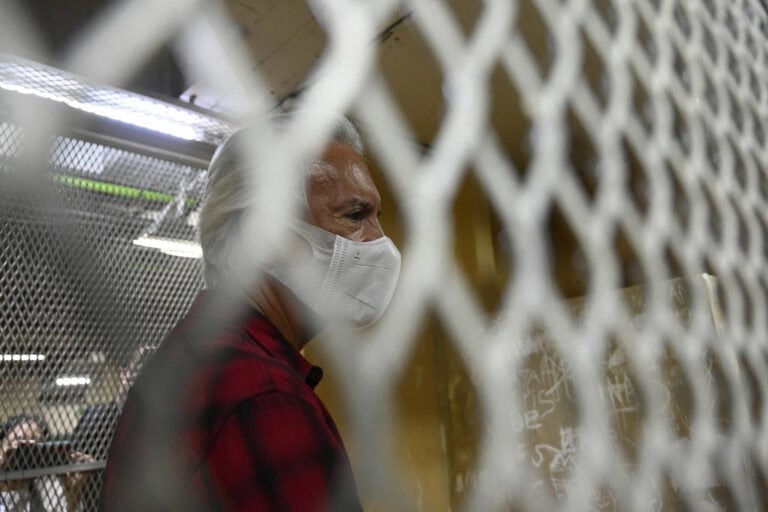(RSF/IFEX) – In a letter to President Alfonso Portillo Cabrera, RSF has asked that Jose Mario Chigua, member of the governing party Guatemalan Republican Front (Frente Republicano Guatemalteco, FRG), and Edgar Orellana, government official, be summoned as soon as possible. The two individuals’ names figure in an investigation being carried out by the Human Rights […]
(RSF/IFEX) – In a letter to President Alfonso Portillo Cabrera, RSF has asked that Jose Mario Chigua, member of the governing party Guatemalan Republican Front (Frente Republicano Guatemalteco, FRG), and Edgar Orellana, government official, be summoned as soon as possible. The two individuals’ names figure in an investigation being carried out by the Human Rights Defender’s Office into the assassination of journalist Jorge Mynor Alegría Armendáriz. “One of this office’s employees and a number of witnesses have received death threats, and as such, it is imperative that you ensure that the investigation advances as swiftly as possible, regardless of the suspects’ political affiliation,” stated RSF Secretary-General Robert Ménard.
The organisation also expressed its concern over the 19 September 2001 statements by Presidential spokesperson Jorge Pérez, who threatened some media with legal action if they continue to publish “unsubstantiated information.” The organisation asked the president to ensure that journalists can freely and safely carry out their work. Since 1 January, around twenty journalists have been threatened or attacked in Guatemala.
Recollection of events thus far
Alegría Armendáriz, host of the “Línea Directa” programme, broadcast on Radio Amatique, based in Puerto Barrios, Izabal department (eastern Guatemala), was killed on 5 September by two unknown individuals who were waiting for him in front of his house. The assailants shot him six times before fleeing on a motorcycle.
The investigation’s conclusions
According to the information collected by RSF, on 20 September, Human Rights Defender Julio Arango announced that his office’s investigation into the murder had reached the conclusion that “those behind the assassination may be officials of the [Puerto Barrios] municipality and the [public company] Portuaria Santo Tomás, who had been accused of corruption on [Alegría’s] programme.” The journalist had condemned Chigua, Puerto Barrios mayor and member of the FRG, and denounced the fact that a number of the employees of Empornac (Santo Tomás Port Authority), the public company that manages the city’s port, had been subjected to pressure by the company’s officials for criticising the corruption plaguing the company.
The Human Rights Defender’s Office’s investigative report noted that the Puerto Barrios mayor had uttered death threats against the journalist on the radio. It also recalled that Orellana, in charge of public relations for Empornac and the municipality, had contacted Alegría Armendáriz a number of times to offer him money or a job in exchange for his silence. According to a 25 September article published by the daily “Prensa Libre”, the information on corruption disclosed by the journalist was corroborated by a report of the Treasury Inspector’s Office, which estimates that hundreds of thousands of dollars were misappropriated by the municipality and Empornac.
The investigation also concluded that those behind the journalist’s assassination may have been members of state security agencies and that the act was premeditated. Arango has provided the Attorney General’s Office with the investigation’s conclusions. He urged the investigators, whose current investigative leads are not considered “credible” by a number of observers, to carry out an extensive investigation based on his office’s findings and provide the witnesses with protection. On the day after Arango’s press conference, the representative of the Human Rights Defender’s Office in Puerto Barrios received death threats.
Threats against the media
In a separate incident, on 19 September, Presidential spokesperson Peréz threatened the written press with legal action if “unsubstantiated news” continues to be published. In August, the daily “El Periodico” reported on the alleged annual expenditure of 220,000 quetzales (approx. US$27,707; 30,500 euros) from public funds to defray the costs of Portillo’s daughter’s education. The daily also condemned the purchase by the presidential private secretary of a helicopter for Nicaraguan President Arnoldo Alemán. Finally, the daily reported that Francisco Alvarado Macdonald, a friend of President Portillo and financial supporter of the FRG’s campaign, had given the Nicaraguan president an armoured Mercedes Benz as a gift. “El Periodico”‘s editorial staff expressed its concern after one of the editors was followed on 20 September by two unknown individuals who were driving around in a stolen car.
Since 1 January, twenty Guatemalan journalists have been threatened or attacked, particularly after having reported on corruption or irregularities committed by governmental authorities. At the end of March, Sylvia Gereda, Luis Escobar, Enrique Castañeda and Martín Juarez of the “El Periodico” newspaper were threatened and targeted after the daily published an investigation into the alleged misappropriation of funds by the president of the National Mortgage Credit Bank (Banco Crédito Hipotecario Nacional), in which members of the government were implicated (see IFEX alerts of 17, 6 and 2 April and 30 March 2001).


